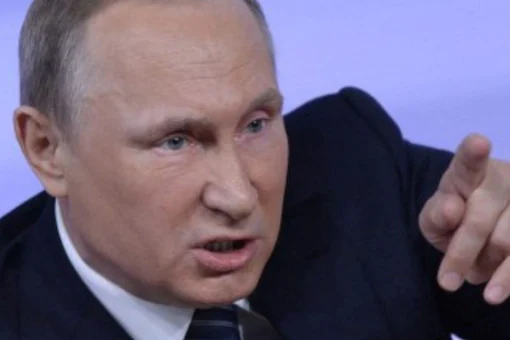
NATO has been beaten by Vladimir Putin’s call of the alliance’s bluff over Ukraine, and should be replaced with a smaller coalition of states willing to be more offensive, according to Britain’s former army chief today.
General Sir Nick Parker termed his proposition ‘controversial,’ but pointed out that the 30-member alliance, which includes the United States, the United Kingdom, and other European states, had been unable to halt Russian President Vladimir Putin’s invasion of Ukraine.
According to a former British Army commander of land troops, NATO is currently on the defensive, maintaining the alliance’s eastern flank, which was last enlarged in 2004.
He told the BBC’s Today Programme that a smaller military alliance would be more suited to ‘developing an offensive counter-strategy against Putin.’
When asked about NATO’s reaction to Moscow’s invasion of Ukraine on BBC Radio 4’s Today programme, General Parker stated, ‘Slightly controversially, I think, I mean Nato’s been defeated, Nato’s bluff was called.’
‘We were powerless to prevent the Russians from stomping all over Ukraine, and now Nato is holding the line of the 2004 expansion, along the Baltic nations, Poland, Hungary, and Romania.’
‘And what it needs to do is protect that line, it’s in what we call a defensive position in military words,’ he explained. And I don’t believe it has the potential to go on the attack with 30 nations all with somewhat different perspectives.
‘We need a smaller coalition of states to begin developing an offensive counter-strategy against Putin.’
His remarks come after Ukraine pledged to abandon its NATO ambitions in order to end the war, with peace negotiations between Moscow and Kyiv slated to restart on Friday.
Putin has exploited NATO’s eastward expansion as one of numerous grounds for his heinous war, and he has demanded that Ukraine embrace neutrality as a condition for withdrawal.
Meanwhile, NATO nations have repeatedly turned down demands from Ukraine’s President Volodymyr Zelensky to personally assist his country’s struggle against Moscow’s invading forces, fearing being drawn into a larger confrontation with Russia.
One of the president’s requests was for NATO to enforce a no-fly zone over Ukraine to assist his air force control the skies. The request was denied due to concerns that it might lead to a third World War.
Putin ordered Russia’s nuclear forces to be placed on high alert last month, and he threatened NATO partners with “consequences bigger than any you have faced in history” if they intervened in the Ukraine crisis.
NATO has increased its forces on its eastern flank while Russia massed soldiers on its border with Ukraine, and since Putin’s invasion began.
It has, however, ruled out any military participation in Ukraine, stating that NATO soldiers would only fight if Russia entered the alliance’s borders.
NATO was created in 1949 with 12 founding members before rapidly growing in the years that followed. It had expanded to 19 members by the end of the century.
With the admission of Bulgaria, Estonia, Latvia, Lithuania, Romania, Slovakia, and Slovenia to NATO in 2004, the alliance gained the most new members, allowing it to have a direct border with Russia for the first time.
Since then, four nations have joined, with North Macedonia being the latest in 2020. Bosnia & Herzegovina, Georgia, and Ukraine have all publicly expressed interest in joining the EU.
Putin is particularly enraged by the thought of Ukraine and George joining NATO. In the previous 15 years, Russian armies have invaded both nations.
Thousands of military and civilians have been slain since Putin’s February 24 invasion of Ukraine. Despite widespread predictions, Ukraine has established a robust defence, preventing Russia from gaining major ground.
According to a NATO officer, between 7,000 and 15,000 Russian soldiers were killed in the combat last week. Ukraine reports that up to 16,000 people have been murdered.
The Ukrainian side provided a framework under which the nation would declare itself neutral during peace negotiations in Istanbul on Tuesday, and the faint contours of a prospective peace accord appeared to form.
In exchange for security assurances from a group of other states, it would abandon its desire to join Nato, as Moscow has long wanted.
According to Russian news media, top Russian officials replied favourably, with foreign minister Sergey Lavrov stating that Ukraine’s willingness to embrace neutrality and seek beyond Nato for security represents’significant progress.’
Ukraine and Russia will restart video discussions on Friday, according to the leader of the Ukrainian team, David Arakhamia.
However, when shells continued to fall on Ukraine on Thursday, scepticism of Russian comments regarding deescalation by Zelensky and others appeared to be justified.
Top Russian military officials have recently stated that the ‘liberation’ of Donbas, the mostly Russian-speaking industrial heartland where Moscow-backed rebels have been fighting Ukrainian forces since 2014. According to Western officials, Moscow is beefing up its forces in the Donbas.
Some commentators believe that the emphasis on the Donbas and the commitment to de-escalate are essentially attempts to put a good gloss on reality: Moscow’s ground troops have been blocked – and have suffered terrible losses – in their attempt to seize the capital and other cities.
On Thursday, the director of GCHQ unleashed an extraordinary attack on Vladimir Putin, stating that his botched “personal war” in Ukraine had backfired disastrously.
Read More News On
Catch all the International News, Breaking News Event and Latest News Updates on The BOL News
Download The BOL News App to get the Daily News Update & Follow us on Google News.




